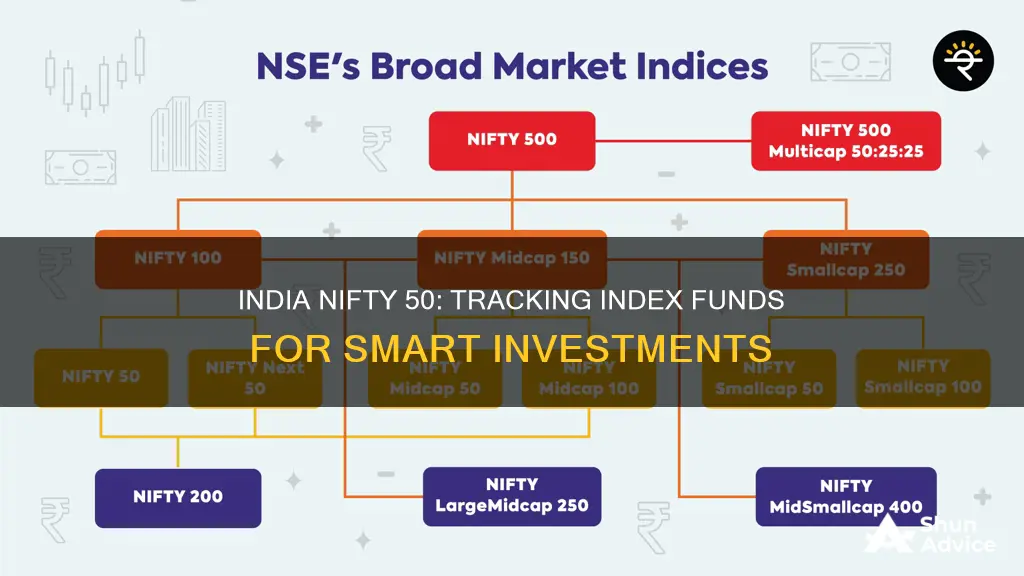
The NIFTY 50 is a benchmark of the Indian stock market index, representing the 50 largest Indian companies listed on the National Stock Exchange. Nifty 50 offers a diversified portfolio of stocks, which can be appealing for investors seeking broad market exposure. There are several ways to invest in the Nifty 50 index, including purchasing individual stocks within the index or investing in exchange-traded funds (ETFs) that track the index.
Nifty 50 index funds are a type of mutual fund or ETF that tracks the performance of the Nifty 50 index. These funds invest in the top 50 companies listed on the National Stock Exchange of India, providing investors with exposure to a range of sectors and industries. The funds aim to replicate the performance of the Nifty 50 index, and their returns are closely linked to the index's performance.
Some of the top Nifty 50 index funds based on 5-year compound annual growth rate (CAGR) include Bandhan Nifty 50 Index Fund, UTI Nifty 50 Index Fund, ICICI Pru Nifty 50 Index Fund, Nippon India Index Fund-Nifty 50 Plan, and Tata Nifty 50 Index Fund.
Nifty 50 index funds offer several benefits, such as passive investment, diversification, low expense ratios, transparency, tax efficiency, and risk management. These funds can be a good investment option for beginners, long-term investors, and those seeking passive investment options, lower expense ratios, and liquidity.
What You'll Learn

Nifty 50 index funds are a passive investment option
Diversification
Nifty 50 index funds invest in the top 50 companies listed on the National Stock Exchange (NSE) of India, providing investors with exposure to a diverse range of sectors and industries. This helps to reduce the risk associated with investing in individual stocks, as the performance of the fund is not dependent on a single company or sector.
Low Expense Ratios
As Nifty 50 index funds are passively managed, they typically have lower expense ratios than actively managed funds. This is because fund managers of index funds do not need to actively select stocks or time the market, and only need to track the index. Lower fees mean that investors can enjoy better returns, as the management fee is comparatively lower.
Transparency
The composition of the Nifty 50 index is publicly available and transparent, making it easy for investors to track the performance of the underlying companies. This transparency allows investors to make informed decisions about their investments.
Tax Efficiency
Nifty 50 index funds are subject to capital gains tax, but they are relatively tax-efficient compared to actively managed funds. This is because they have lower portfolio turnover, and therefore generate fewer capital gains.
Risk Management
Nifty 50 index funds provide risk management benefits due to their diversified nature. The risk is spread across various sectors and companies, reducing the impact of any single company's poor performance on the overall portfolio.
Nifty 50 index funds can be purchased directly from mutual fund companies or through online platforms and mobile apps. They are a good investment option for beginners, long-term investors, and those seeking passive investment options with low expense ratios and liquidity.
India's Future: Strategic Investment Opportunities and Challenges
You may want to see also

Nifty 50 index funds offer a diversified portfolio
One of the key advantages of investing in Nifty 50 index funds is the diversification it offers. By investing in a single fund, investors gain access to 50 major companies across various industries, reducing the risk associated with investing in individual stocks. The funds provide a well-rounded portfolio, spreading investments across a diverse range of sectors and companies. This diversification benefit is further enhanced by the fact that indices typically have limits on individual stock exposure, ensuring that the portfolio is not overly concentrated in any one company.
Nifty 50 index funds are also attractive due to their cost-effectiveness. As passive investment instruments, these funds have lower expense ratios compared to actively managed funds. The fund managers of Nifty 50 index funds do not need to make active investment decisions, but only need to track the index and adjust the fund's holdings to match its composition. This passive investment approach results in lower costs, which translates to higher returns for investors.
In addition to diversification and cost-effectiveness, Nifty 50 index funds offer other benefits such as simplicity, transparency, and liquidity. These funds offer a straightforward investment approach, making them appealing to those who prefer a passive investment strategy. The fund's portfolio reflects the Nifty 50 Index, providing transparency on which companies are included in the fund. Nifty 50 index funds are also traded on the stock exchange, providing investors with the flexibility to buy and sell their investments easily.
Overall, Nifty 50 index funds provide a compelling option for investors seeking a low-maintenance, diversified investment with the potential for steady growth. They are particularly suitable for beginner investors, long-term investors, risk-averse investors, and those who prefer a passive investment approach. By investing in Nifty 50 index funds, individuals can gain exposure to a broad market segment and participate in the growth of India's leading companies.
Presenting an Investment Portfolio: Strategies for Success
You may want to see also

Nifty 50 index funds are traded on the stock exchange
Passive Investment Approach
Nifty 50 index funds are passive investment instruments, meaning they aim to replicate the performance of the Nifty 50 index. The fund manager's role is limited to tracking the index and adjusting the fund's holdings to match its composition. This passive approach results in a lower total expense ratio compared to actively managed funds, making Nifty 50 index funds a cost-effective investment option.
Diversification
Nifty 50 index funds invest in a diversified portfolio of India's top 50 large-cap companies across various sectors. This provides investors with broad exposure to the Indian equity market and reduces the risk associated with investing in individual stocks. The diversification offered by Nifty 50 index funds can be beneficial for risk-conscious investors seeking a well-rounded portfolio.
Market Representation and Liquidity
Nifty 50 index funds provide investors with exposure to the broader Indian equity market and insights into the overall economic landscape. Additionally, the Nifty 50 index includes highly liquid stocks, which can provide investors with benefits such as ease of buying or selling without significantly impacting their price.
Benchmark Performance
The Nifty 50 index serves as a benchmark for the Indian equity market. Investors can use this benchmark to assess the performance of their Nifty 50 index fund investments, providing a transparent and straightforward way to evaluate their investment.
Low Portfolio Turnover
Due to their passive nature, Nifty 50 index funds may have lower portfolio turnover, which can reduce transaction costs and potentially improve tax efficiency for investors.
Absence of Fund Manager Bias
The role of the fund manager in a Nifty 50 index fund is solely to replicate the tracked index. There is no need for personal stock selection or timing the market, eliminating the risk of personal bias in investment decisions.
Cost-Effective Investment
The cost of managing a Nifty 50 index fund is lower compared to actively managed equity mutual funds. This is because a team of analysts is not required for extensive research or timing the market for individual stock entries and exits. Consequently, the expense ratios of Nifty 50 index funds are typically lower, resulting in better returns for investors over time.
Diversified Portfolio
The Nifty 50 index comprises a diversified basket of stocks across various sectors, with limits on individual stock exposure. Nifty 50 index funds replicate this diversified portfolio, allowing investors to minimise risk and achieve a high degree of diversification at a low cost.
How to Invest in Nifty 50 Index Funds
There are several ways to invest in Nifty 50 index funds:
- Direct stock purchase: Buying shares of each of the 50 companies individually through a stockbroker.
- Exchange-Traded Funds (ETFs): Investing in Nifty 50 through ETFs that track the index and are traded on stock exchanges like regular stocks.
- Mutual Funds: Many mutual funds offer schemes that invest in Nifty 50 stocks.
- Index Futures and Options: Advanced investors can trade Nifty 50 futures and options contracts.
Wealth Management: When to Hire a Money Manager
You may want to see also

Nifty 50 index funds have a lower expense ratio
Nifty 50 index funds are a type of investment fund that aims to replicate the performance of the Nifty 50 index, which comprises 50 large, actively traded stocks on the National Stock Exchange of India (NSE). These funds are passively managed, meaning they track the underlying index and adjust their holdings to match its composition. This passive investment approach results in a lower expense ratio compared to actively managed funds, making Nifty 50 index funds a cost-effective investment option.
- Absence of Fund Manager Bias: The role of the fund manager in a Nifty 50 index fund is limited to replicating the tracked index. There is no need for personal stock selection or market timing, which eliminates the risk of personal bias.
- Cost-Effective Investment: The cost of managing a Nifty 50 index fund is lower than that of actively managed funds because extensive research and a team of analysts are not required. This results in lower fees for investors.
- Diversified Portfolio: Nifty 50 index funds invest in a diversified portfolio of 50 large-cap stocks across various sectors. This diversification benefits risk-conscious investors by minimising risk and providing exposure to a well-rounded portfolio.
- Market Representation and Liquidity: Nifty 50 index funds provide investors with exposure to the broader Indian equity market and highly liquid stocks. This allows investors to gain insights into the overall economic landscape and easily buy or sell stocks without significantly impacting their price.
- Low Portfolio Turnover: Due to their passive nature, Nifty 50 index funds typically have lower portfolio turnover, reducing transaction costs and providing potential tax efficiency for investors.
Overall, Nifty 50 index funds offer a cost-effective, diversified, and user-friendly avenue for investors to tap into the performance of India's largest corporations. They are suitable for beginners, long-term investors, and those seeking passive investment options with lower expense ratios. However, as with any investment, it is essential to consider investment goals, risk tolerance, and investment horizons before investing in Nifty 50 index funds.
Oil Giants Eye India's Gas Production Potential
You may want to see also

Nifty 50 index funds are subject to capital gains tax
Nifty 50 index funds are a type of investment fund that aims to replicate the performance of the Nifty 50 index, which comprises the top 50 large, actively traded stocks on the National Stock Exchange of India (NSE). These funds provide investors with exposure to a diversified portfolio of leading companies across various sectors, offering a convenient and cost-effective way to participate in the potential growth of the Indian stock market.
When it comes to taxation, Nifty 50 index funds are subject to capital gains tax. In India, the tax on returns from index funds depends on the investor's income tax slab and the duration for which the investment is held. Here's an overview of the capital gains tax treatment for Nifty 50 index funds:
Short-Term Capital Gains (STCG):
If an investor holds units of Nifty 50 index funds for less than 12 months (or one year, according to some sources), the gains made are considered short-term capital gains. These gains are typically taxed at a flat rate of 15% plus applicable surcharge and cess. However, it's important to note that short-term capital gains may also be taxed according to the investor's income tax slab rate, which can range from 10% to 37%.
Long-Term Capital Gains (LTCG):
On the other hand, if an investor holds units of Nifty 50 index funds for more than 12 months (or one year), the gains are considered long-term capital gains. Currently, long-term capital gains on Nifty 50 index funds are taxed at a rate of 10% plus applicable surcharge and cess if the total capital gains in a financial year exceed INR 1 lakh. It's important to stay updated with the latest budget announcements and tax laws, as the tax rates and rules may change over time.
Tax Efficiency:
While Nifty 50 index funds are subject to capital gains tax, they are relatively tax-efficient compared to actively managed funds. This is because index funds have lower portfolio turnover, resulting in fewer capital gains being generated. Additionally, the passive nature of index funds means that fund managers do not actively buy and sell stocks, further reducing transaction costs and potential tax liabilities.
In summary, Nifty 50 index funds offer investors a passive and cost-effective way to invest in the Indian stock market. While these funds are subject to capital gains tax, the tax treatment depends on the holding period and the investor's income tax slab. Investors should consult a financial advisor or tax professional to understand the specific tax implications of investing in Nifty 50 index funds.
Condo Conundrum: Save or Invest?
You may want to see also
Frequently asked questions
The Nifty 50 Index is a benchmark of the Indian stock market index that represents the average of the 50 largest Indian companies listed on the National Stock Exchange (NSE). It was launched on 22 April 1996 and is owned and managed by NSE Indices, a wholly-owned subsidiary of the NSE.
Investing in Nifty 50 Index Funds offers several benefits, including diversification across a range of sectors and industries, exposure to the top-performing companies in India, and a low-cost investment option with potential for long-term capital appreciation.
You can invest in Nifty 50 Index Funds through various channels, such as online platforms, mutual fund companies, and financial advisors. The process typically involves choosing a fund that meets your investment goals, completing your Know Your Customer (KYC) formalities, and making the investment.
Direct Nifty 50 index funds are purchased directly from the mutual fund company or through online platforms, while regular funds are bought through intermediaries like brokers or financial advisors. Direct plans usually have lower expense ratios and slightly higher Net Asset Values (NAVs) due to the reduced fees.
The gains from Nifty 50 Index Funds are taxed based on whether they are short-term or long-term capital gains. If held for less than a year, gains are taxed as short-term capital gains at a flat rate of 15% plus applicable surcharge and cess. If held for more than a year, they are taxed as long-term capital gains at a rate of 10% plus applicable surcharge and cess if total capital gains exceed Rs. 1 lakh in a financial year.







